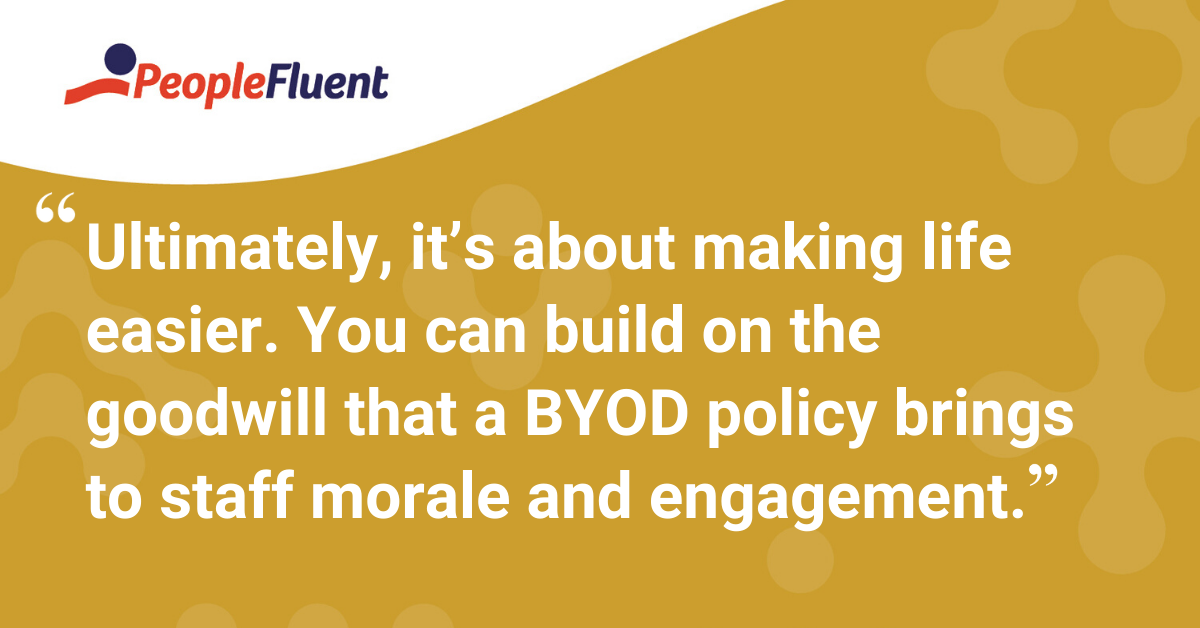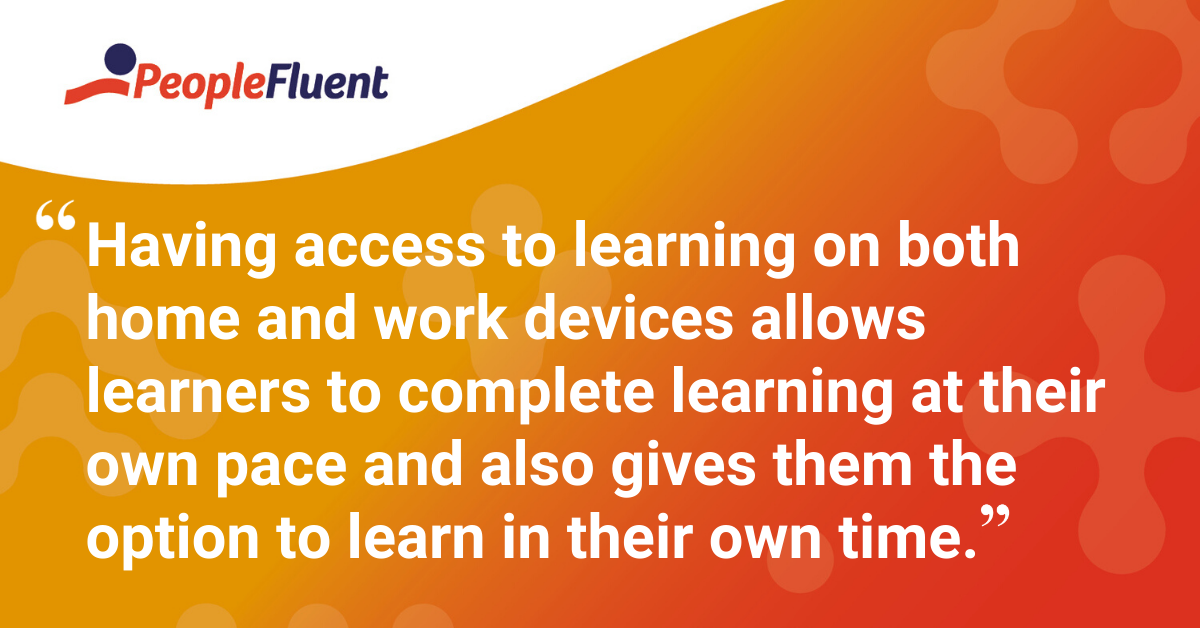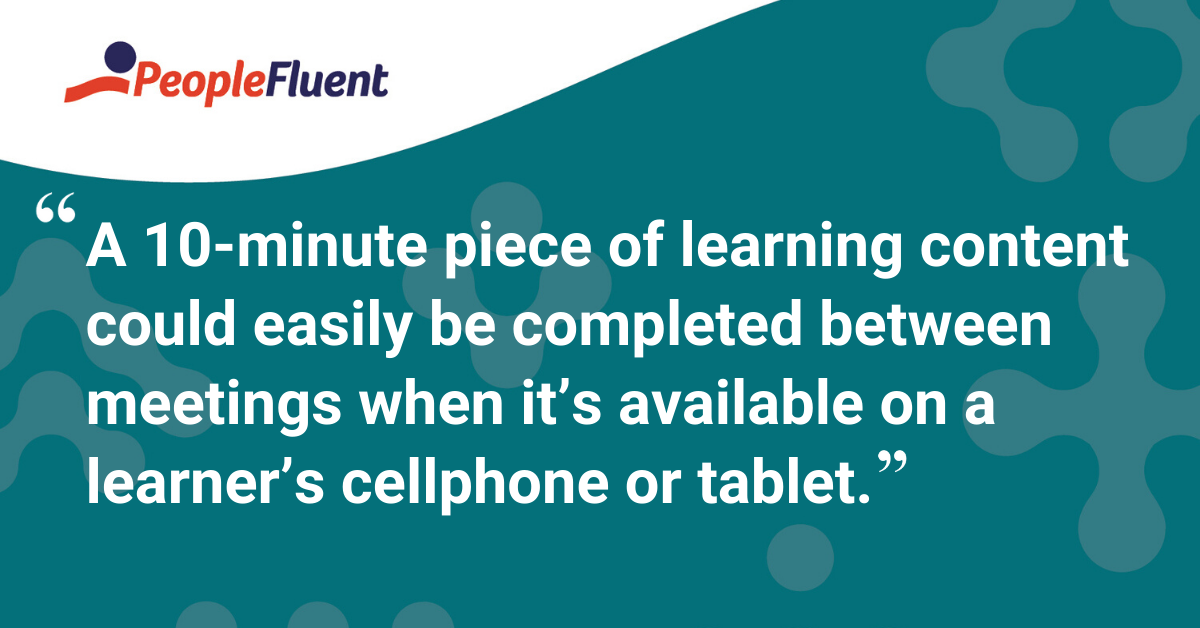Published: Mar 25, 2019Time to read: 4mins Category: Learning
3 Benefits of a BYOD Policy for Your Learning Programs
In case you haven't heard the acronym, BYOD, it stands for ‘Bring Your Own Device’. These days, many employees are using their own cellphones, tablets, and laptops at work—and outside of work—to get things done.
A survey conducted by Tech Pro Research1 found that out of 206 respondents, 59% said they allowed employees to use their personal devices at work. Another piece of research by Syntonic2 also found that of their 400 respondents, 59% had a formal BYOD policy in place.
While there are many business benefits for BYOD in terms of cost savings and increased productivity, a BYOD policy also has a range of benefits for those delivering learning too.
1. BYOD Policies Increase Learner Engagement

L&D teams can benefit from the cultural impact of a BYOD policy. Employees may have felt constricted by being forced to use devices that aren’t what they like to use in their day-to-day lives. For example, those who use Apple devices may feel frustrated at having to use Windows or Android devices at work, or vice versa.
Ultimately, it’s about making life easier. Staff can carry around one cellphone instead of two. They can work remotely without having to remember to bring the company laptop home.
An organization that allows employees the freedom to use their own devices is an organization that is showing that it’s considerate of its workers and their preferences. By following that lead with your own learning delivery, you can build on the goodwill that a BYOD policy brings to staff morale and engagement.
Recommended related reading: 'The 13 Must-Have Features of a Learning Management'
2. BYOD Policies Empower Self-Directed Learning

A BYOD policy gives you the opportunity to deliver more self-directed learning. When your learners have more freedom and flexibility to use their own devices, their learning journeys can likewise become more independent.
For example, before Morses Club started using a mobile LMS application, their learners had to travel to local offices to complete learning on their manager’s laptops. Once they could access learning through PeopleFluent, staff were free to complete their learning wherever and whenever they wanted to.
Having access to learning on both home and work devices allows learners to complete learning at their own pace and also gives them the option to learn in their own time.
Want to know more about how Morses Club is embracing mobile learning through its LMS? Click here to read the story.
3. BYOD Policies Improve Productivity and Completion Rates

A 2016 report by research company, Frost and Sullivan3, found that using personal devices for work activities saves employees 58 minutes per day while increasing productivity by 34%. It’s likely that this is down to the fact that these devices are always at hand, and take away the extra complication of firing up a work laptop or even going back to the office to work on a PC.
That same boost to productivity can also apply to learning. Making your learning programs more portable and easier to access can take away barriers to course completion.
LinkedIn’s 2019 Workplace Learning Report found that 74% of learners want to learn in spare time at work. Giving staff access to learning on their own devices makes this is a far easier prospect, particularly when combined with a microlearning approach. For example, a 10-minute piece of learning content could easily be completed between meetings when it’s available on a learner’s cellphone or tablet.
Also read: 'How Mobile Devices Can Transform Your Learning'
BYOD and Security Concerns
Allowing staff to use their own device raises important concerns about the security of confidential business data. There’s no doubt that for many organizations, the risk of a serious data breach could outweigh the benefits that a BYOD policy brings. But with the right approach, data can be well protected.
For learning specifically, it’s vital to ensure you deliver your learning content through a secure platform. For example, we manage PeopleFluent LMS applications and data in ISO27001-certified facilities. This means we implement strict guidelines, checks and back up procedures to protect client data.
It’s sensible to be a little cautious about the use of personal devices at work, but with the right procedures, controls and technologies in place, a BYOD policy can be a real aid to learner engagement.
Additional sources
1. Tech Pro Research (2016), 'BYOD, IoT and wearables thriving in the enterprise'
2. Syntonic (2016), 'Syntonic 2016 Employer Report: BYOD Usage in the Enterprise'
3. Samsung Insights (2016), 'Employees Say Smartphones Boost Productivity by 34 Percent: Frost & Sullivan Research'
Discover How Learning Builds Skills and Ensures Compliance
Design, deploy, track, analyze, and report on enterprise learning and compliance programs. PeopleFluent helps you execute your programs seamlessly, so employees upgrade their skills and you get results.